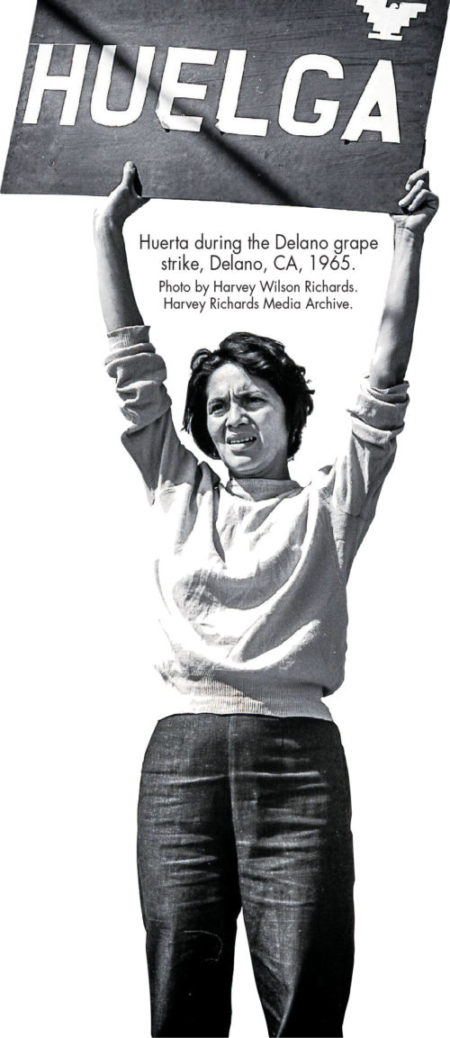
Left: Huerta leads UFW supporters in a march, early 1970s. Unidentified photographer, Walter P. Reuther Library, Archives of Labor and Urban Affairs, Wayne State U. Middle: Huerta speaking at History Colorado in Dec. 2019. Photo by Ryan Erickson, courtesy History Colorado. Right: Huerta signing up members at the founding convention of the National Farm Workers Association (NFWA), Sept. 30, 1962. Photo by Joseph Francis Gunterman. Walter P. Reuther Library, Archives of Labor and Urban Affairs, Wayne State U.

For those who think nostalgically about the 1960s’ activism, Dolores Huerta says, “Sorry you missed 1968, but we’re back.” A crowd of 300 chants “Sí se puede!” (Yes you can!), the motto of the United Farm Workers (UFW), as she takes her seat at History Colorado. The Presidential Medal of Freedom awardee is here to share her thoughts on civic engagement and her work in civil rights as part of the “Bold Women. Change History.” series honoring the centennial of women’s voting rights.
Huerta sees the 1960s as a cultural revolution, and suggests that today’s growing wealth gap signals an incipient economic revolution. “So many of the problems we are seeing now are because of the income inequality. We have 1% of the families owning 50% of the wealth….We have 10% of the wealthy corporations and families own 90% of the wealth.” Huerta says voters need to ask candidates how they plan to address income inequality.
Huerta is most famous for her role as a leader of the UFW, which she co-founded with César Chávez. “I said ‘César, when people think of California, they don’t think of potatoes,’” recalls Huerta of arguing with Chávez. He wanted a potato boycott—but her women’s intuition dictated otherwise. “And I won,” she says, speaking of what became the famous grape boycott of 1965-70. The strike of Filipino and Mexican grape pickers, marches and consumer boycotts of non-union grapes resulted in a win for about 10,000 farm workers, too. In 1970, they reached a collective bargaining agreement that increased wages, benefits and worker protections.
For those who only learned about Chávez, and not Huerta, consider yourselves shortchanged. Huerta’s role in the labor movement was pivotal, though she admits that she initially questioned whether she could lead farm workers, coming from the middle class and never having worked in the fields herself. She now recognizes this as the typical self-doubt many women possess and encourages women to move past that: “If you aspire to something…and it’s something you would really like to do, but you have that doubt…just do like the guys do and learn on the job!”
Not one to rest on her laurels since receiving this nation’s and Mexico’s highest civilian honors, Huerta continues to promote civic engagement, LGBTQ rights, health and environmental causes, education, and economic development through her namesake foundation (www.doloreshuerta.org). “Democracy is something we have to be actively engaged in; we can’t take it for granted.” Hearing Huerta speak on the feast day of the Virgin of Guadalupe (Dec. 12) is especially meaningful given her devotion to the Virgin Mary—but the Guadalupana is not a submissive Mary. She is the brown-skinned Mary who speaks to and for the humble. Huerta’s mother, as a follower of St. Francis Xavier, instructed her children to help others as an act of faith. It was important, however, to never ask for recompense; “because if you ask for something in return, that’s quid pro quo” Huerta quips.
Huerta decries the “bigotry” that exists against manual workers in the U.S. and encourages those with college educations to work to make the world a better place rather than focus on making money: “That should not be a career, to get rich. No matter how much money you have, you can only eat three meals a day.”
At 89, Huerta remains relevant and engaged. She is feisty, funny, and gracious, answering audience questions with a mix of history, feminism, and a humor that comes from decades in the struggle for civil rights. She ends the evening reminding those present of our common humanity, including our origins in Africa. “We have to do everything we can to fight racism…we are all Africans in different shades of color.” To learn more about the Bold Women series that runs through September 2020, go to https://www.historycolorado.org/bold-women-change-history.
These images are part of Dolores Huerta: Revolution in the Fields/Revolución en los Campos, organized by the Smithsonian Institution Traveling Exhibition Service in collaboration with the National Portrait Gallery, Washington, D.C. This exhibition received federal support from the Latino Initiatives Pool, administered by the Smithsonian Latino Center. It will be at the Greeley History Museum 6/27/20 – 9/27/20. See https://www.sites.si.edu/s/tour-schedule




0 Comments